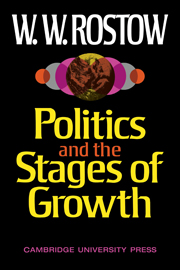Book contents
- Frontmatter
- Contents
- Tables
- PREFACE
- INTRODUCTION
- 1 A way of looking at politics
- 2 Politics in pre-Newtonian societies
- 3 The politics of the preconditions for take-off
- 4 The politics of the take-off and the drive to technological maturity
- 5 American politics: a not so special case
- 6 The politics of the search for quality
- 7 Politics and democracy in the contemporary developing world
- 8 War and peace in the global community
- APPENDIX: The views of others in relation to the approach taken here
- NOTES
- INDEX
7 - Politics and democracy in the contemporary developing world
Published online by Cambridge University Press: 16 October 2009
- Frontmatter
- Contents
- Tables
- PREFACE
- INTRODUCTION
- 1 A way of looking at politics
- 2 Politics in pre-Newtonian societies
- 3 The politics of the preconditions for take-off
- 4 The politics of the take-off and the drive to technological maturity
- 5 American politics: a not so special case
- 6 The politics of the search for quality
- 7 Politics and democracy in the contemporary developing world
- 8 War and peace in the global community
- APPENDIX: The views of others in relation to the approach taken here
- NOTES
- INDEX
Summary
DEMOCRACY
The Change in Expectations
On the eve of the First World War, it was not unreasonable for men to believe that parliamentary democracy was the natural – and probably universal – outcome of economic and social progress. The English-speaking world, France, Scandinavia, and Germany had all evolved in this direction. In their own way, even the more exotic latecomers – imperial Japan and Russia – had taken steps down this road. Vast China had just formed a Republic whose banners included the democratic aspiration. Latin America, with all it vicissitudes and imperfections, had been committed for almost a century to the common doctrines of a democratized West. And the colonial world was almost wholly under the tutelage of nations which had long practiced democracy.
All this changed with the First World War and its aftermath. Since the 1920s and the failure of Woodrow Wilson's simplistic crusade to make the world safe for democracy, the concept of democracy has been on the defensive. The world of Mussolini, Lenin, and Harding – then of Hitler, Stalin, the Japanese militarists, and Chamberlain – did not suggest that democracy, as classically conceived, was the wave of the future. Nor did the Great Depression and Franklin Roosevelt's impotence in the face of American isolationists.
In the end, the effectively mobilized power of the British Commonwealth and the United States saw the Allies through the Second World War; but the global political community since 1945 was not a setting which revived facile ideological optimism.
- Type
- Chapter
- Information
- Politics and the Stages of Growth , pp. 267 - 301Publisher: Cambridge University PressPrint publication year: 1971



